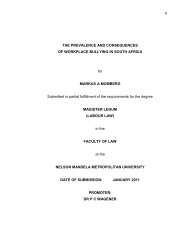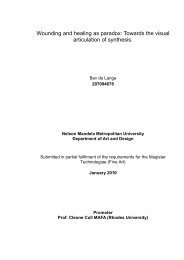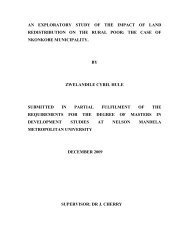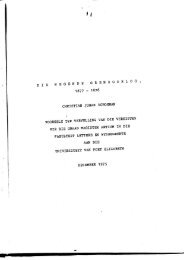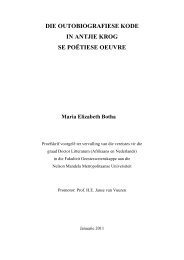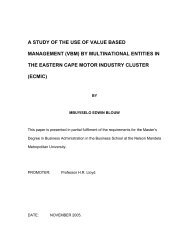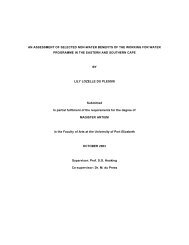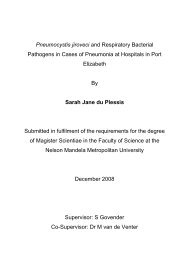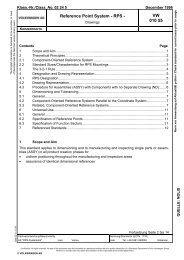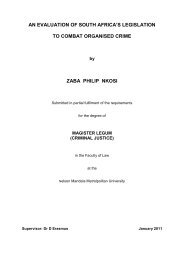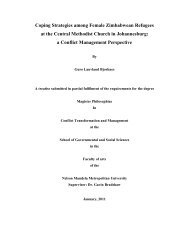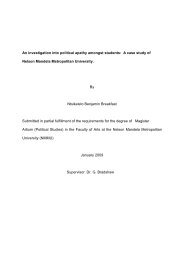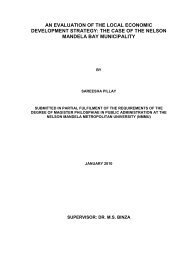Elaine Browne.pdf - Nelson Mandela Metropolitan University
Elaine Browne.pdf - Nelson Mandela Metropolitan University
Elaine Browne.pdf - Nelson Mandela Metropolitan University
You also want an ePaper? Increase the reach of your titles
YUMPU automatically turns print PDFs into web optimized ePapers that Google loves.
30<br />
T: I, I think learners can enjoy this Arts and Culture but what is lacking is that we don’t have that knowledge of<br />
Arts and Culture and I think. I just teachers must ... must go under ... um I don’t know, let them ... I don’t want<br />
to say they must go to school. They must go back to school. They go under certain training, certain in‐service<br />
training, so that they can be able to get more knowledge about Arts and Culture so that they can be able to<br />
teach learners these Arts and Culture the way it is supposed to be taught to them. You know. Another thing is, is<br />
is resources. We don’t have resources. We don’t have a space for Arts and Culture because Arts and Culture<br />
need a special class so thet learners must go there for Arts and Culture. Then ... Once they get in that class, may<br />
be is, that class is special for Arts and Culture. Something can happen or change them you know and motivate<br />
them. Those are the things we experience here at at our school.<br />
<strong>Elaine</strong>: So where do you do Arts and Culture?<br />
T: You just do the stuff in the class you know ...<br />
U: Or outside if you’re supposed to run outside.<br />
T: And, and when you say we must do the dance, there is not enough space in the class. The class is full.<br />
U: And then if if Arts and Culture was, can be divided into sections. Let’s say this term, let’s do art, next term do<br />
these dance, next term make music and so on. But not in the same quarter, dance and do re me in the same<br />
quarter. Makes you miserable, you as the teacher. Because you are doing this ... Because you are doing the Arts.<br />
Let say dance, they not even start to know that to learn that. What, what are they going to do, then say music.<br />
We don’t have pianos, we don’t have everything that’s, instruments for the music in our schools.<br />
T: In fact we don’t know music, even I, I don’t know music, I don’t know other teacher, I don’t know music.<br />
U: I don’t speak of that basic thing that you know but implementing a little bit that you know. How do you do<br />
that? (Speaking in Xhosa to the others) Only a little knowledge. So if you, if, if they can do workshops and this<br />
workshops for instance ... If we are going to workshops, the teachers in our aid it takes two things. It takes a<br />
day, or or from two to four. It takes so little a time then we would go there. We would be given and you come<br />
with packs of things and that and you don’t even know where to start implementing that. We put those right<br />
there (She shows with her hand to the top shelf of a cupboard nearby) and do what you are suppose to do or do<br />
whatever or do what you are already doing. Like nobody will ever even come to see if, how are, are you going<br />
through. How are you handling that you came herewith. So it is just like that.<br />
<strong>Elaine</strong>: The information was not practical enough ...<br />
U: When, when when I look at TV for instance this this feelings like High School Musicals or whatever. When<br />
you look at those things you say: Auh, if I can get there, if I can only get that because when I see them I see, if, if<br />
this one is doing music ... There is a little bit of dance there, this one is doing music, a little bit of drama there<br />
and



